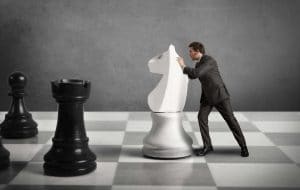I remember where I was when I first heard about coronavirus, it wasn’t called COVID-19 then.
I was on the other side of the world on a cruise with Pam, for our annual end of year overseas excursion and this virus thingy was a problem that was happening in China.
Who would’ve thought then we’d be where we are today with a worldwide pandemic, a recession, and so much political and social unrest?
Today those pre-COVID-19 days in January feel like a different lifetime.
COVID upended everything and still today every new day seems to bring a new shock.
A lockdown in Victoria, the worst recession in a century, massive unemployment, business closures.
But if you survey the confusing mess we’re in you have to remember that none of it happened in a vacuum.
Every event has parents, grandparents, siblings, and cousins – previous events that planted the seeds, passed on their DNA, and continue to influence what’s happening today.
To have any hope of making sense of what’s ahead we have to pay attention to a bunch of seemingly unrelated stories that began before anyone had heard of Covid-19 and that’s what I’m going to be talking about today with leading demographer Simon Kuestenmacher.
So let’s have a chat about what got us to where we are today and what’s ahead.
Understanding the factors that help us forecast the future
If you were told in January what April 2020 would look like, you wouldn’t have believed it, would you?
If you were told in May that in August we’d have Stage 4 Lockdown, you wouldn’t have believed it.
So how do you begin to make sense of the future when things change so fast?
I recently read a great article on from Morgan Housel, one of my favorite social commentators where he explained that until we know where we’ve been and how we got here it’s difficult to figure out where we’re heading.
Why are so many people so angry?
To understand why so many people are so angry in 2020 you have to realize that half the world has gained insight into the other half at the very moment those halves were as different economically as they’ve ever been.
Over the years the gap between the haves and have-nots grew - people grew apart financially at the same time they became connected digitally, which exacerbates tribal instincts and exposes you to people who don’t see the world as you do, who become easy targets for criticism and blame.
Was an increase in working from homecoming anyway? 
Up until recently working from home was not really an option, but let’s look at how things have changed:
A century-long shift away from labor-intensive jobs towards creative-thinking jobs created a stark contrast between jobs that can be done during a pandemic and jobs that can’t.
The pandemic has brought forward some trends that probably would have happened anyway, including working from home.
Pandemics are not new or unheard of, so why does this one feel so much different from similar events in the past?
Things have been pretty good for a long time. So a setback, even if it’s not unprecedented, feels overwhelming.
The coronavirus pandemic feels real to us in a way that pandemics that we’ve only read about in history textbooks cannot.
For future generations, 2020 will likely be only a page in the history books that doesn’t carry the same urgency we feel while living in it.
Why is the news so negative?
Local news gave way to national news which gave way to global news, which can make the world feel perpetually broken because there is always a tragedy somewhere, and now you are guaranteed to hear about it.
Why haven’t the direst predictions about the economy come to pass?
The Federal Reserve in the US and the RBA here and the central banks around the world learned how to keep the financial system from falling apart. That’s both kept a lot of the economy humming and ruined a lot of assumptions people had about how the economy works.
Links and Resources:
The article By Morgan Housel quoted in this show here: Here We Are: 5 Stories That Got Us To Now
Simon Kuestenmacher - Director of Research at The Demographics Group
In these challenging times why not get the team at Metropole to build you a personalized Strategic Property Plan – this will help both beginning and experienced investors.
Some of our favourite quotes from the show: 
“A century ago people had more labor-intensive jobs. Now we’ve gone to more creative thinking jobs.” –Michael Yardney
“We were feeling complacent, I believe now we’re going to probably think differently moving forward.” –Michael Yardney
“Bad news seems to get more attention than good news because pessimism is seductive. It feels more urgent than optimism.” – Michael Yardney
PLEASE LEAVE US A REVIEW
Reviews are hugely important to me because they help new people discover this podcast. If you enjoyed listening to this episode, please leave a review on iTunes - it's your way of passing the message forward to others and saying thank you to me. Here's how
Subscribe & don’t miss a single episode of Michael Yardney’s podcast
Hear Michael & a select panel of guest experts discuss property investment, success & money related topics. Subscribe now, whether you're on an Apple or Android handset.
Need help listening to Michael Yardney’s podcast from your phone or tablet?
We have created easy to follow instructions for you whether you're on iPhone / iPad or an Android device.
Prefer to subscribe via email?
Join Michael Yardney's inner circle of daily subscribers and get into the head of Australia's best property investment advisor and a wide team of leading property researchers and commentators.

![[Podcast] There are a few things we must understand before we try and forecast the future | with Simon Kuestenmacher](https://cdn.propertyupdate.com.au/wp-content/uploads/2020/09/MY-podcast-207-It%E2%80%99s-important-to-understand-how-we-got-us-where-we-are-before-we-try-and-forecast-the-future.jpg)











